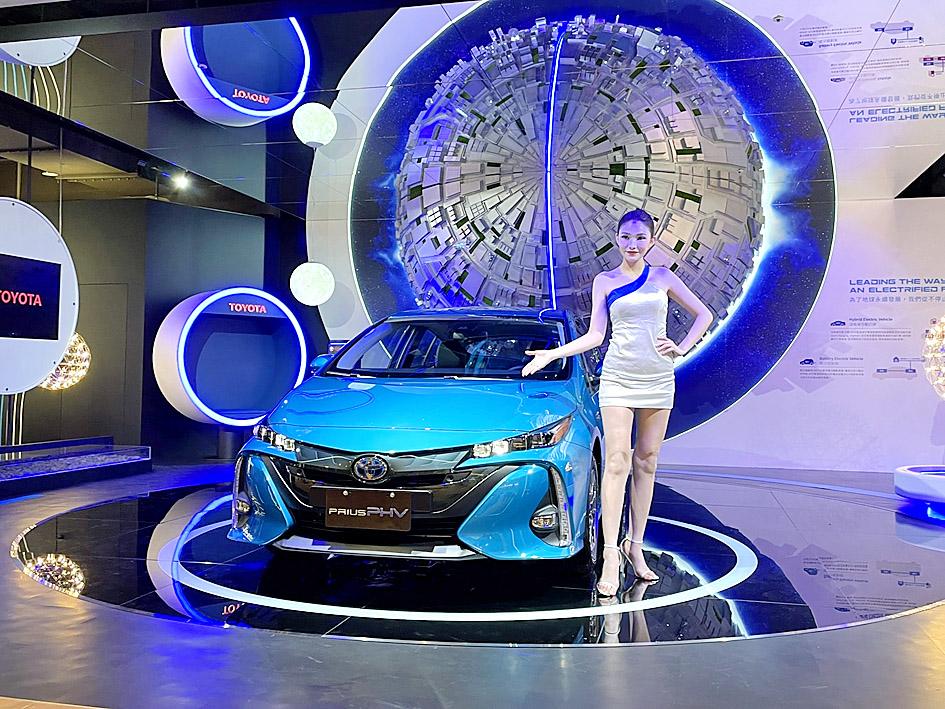Hotai Motor Co (和泰汽車), the local sales agent of Toyota and Lexus vehicles, yesterday kept its vehicle sales target for this year unchanged on expectations that the robust sales from January to last month would offset a recent weakness amid rising COVID-19 infections.
The company still aims to sell 154,000 vehicles this year, up 5.48 percent from 146,000 units last year, it said in a presentation paper, after vehicle sales surged 118.3 percent year-on-year to 54,297 units during the first four months of this year.
That gave Hotai a market share of 34 percent in Taiwan.

Photo: Amy Yang, Taipei Times
After offering a revamped Toyota Sienna in March, the company plans to launch more new models in the second half of the year to spur growth, including the Gazoo Racing (GR) series from Toyota Motor Corp.
The GR Yaris would be available next quarter, while the GR 86 would hit the market in the fourth quarter, Hotai said.
The company also retained its forecast for new vehicle sales in Taiwan at 440,000 units for this year, down 3.72 percent from last year’s 457,000 units, because of a shortage of automotive chips and the effect of a COVID-19 outbreak.
If the number of cases could be curbed in two to three months, there could be a rebound in demand, the company said.
Rising vaccinations would also help, it said.
Hotai’s net profit soared 44 percent to NT$5 billion (US$179.71 million) in the first quarter, compared with NT$3.47 billion in the same period last year, company data showed.
Earnings per share jumped to NT$9.16 from NT$6.35 a year earlier.
Revenue expanded 15 percent to NT$56.1 billion, from NT$48.75 billion, during the same period.

Semiconductor business between Taiwan and the US is a “win-win” model for both sides given the high level of complementarity, the government said yesterday responding to tariff threats from US President Donald Trump. Home to the world’s largest contract chipmaker, Taiwan Semiconductor Manufacturing Co (TSMC, 台積電), Taiwan is a key link in the global technology supply chain for companies such as Apple Inc and Nvidia Corp. Trump said on Monday he plans to impose tariffs on imported chips, pharmaceuticals and steel in an effort to get the producers to make them in the US. “Taiwan and the US semiconductor and other technology industries

A start-up in Mexico is trying to help get a handle on one coastal city’s plastic waste problem by converting it into gasoline, diesel and other fuels. With less than 10 percent of the world’s plastics being recycled, Petgas’ idea is that rather than letting discarded plastic become waste, it can become productive again as fuel. Petgas developed a machine in the port city of Boca del Rio that uses pyrolysis, a thermodynamic process that heats plastics in the absence of oxygen, breaking it down to produce gasoline, diesel, kerosene, paraffin and coke. Petgas chief technology officer Carlos Parraguirre Diaz said that in

SMALL AND EFFICIENT: The Chinese AI app’s initial success has spurred worries in the US that its tech giants’ massive AI spending needs re-evaluation, a market strategist said Chinese artificial intelligence (AI) start-up DeepSeek’s (深度求索) eponymous AI assistant rocketed to the top of Apple Inc’s iPhone download charts, stirring doubts in Silicon Valley about the strength of the US’ technological dominance. The app’s underlying AI model is widely seen as competitive with OpenAI and Meta Platforms Inc’s latest. Its claim that it cost much less to train and develop triggered share moves across Asia’s supply chain. Chinese tech firms linked to DeepSeek, such as Iflytek Co (科大訊飛), surged yesterday, while chipmaking tool makers like Advantest Corp slumped on the potential threat to demand for Nvidia Corp’s AI accelerators. US stock

SUBSIDIES: The nominee for commerce secretary indicated the Trump administration wants to put its stamp on the plan, but not unravel it entirely US President Donald Trump’s pick to lead the agency in charge of a US$52 billion semiconductor subsidy program declined to give it unqualified support, raising questions about the disbursement of funds to companies like Intel Corp and Taiwan Semiconductor Manufacturing Co (台積電). “I can’t say that I can honor something I haven’t read,” Howard Lutnick, Trump’s nominee for commerce secretary, said of the binding CHIPS and Science Act awards in a confirmation hearing on Wednesday. “To the extent monies have been disbursed, I would commit to rigorously enforcing documents that have been signed by those companies to make sure we get